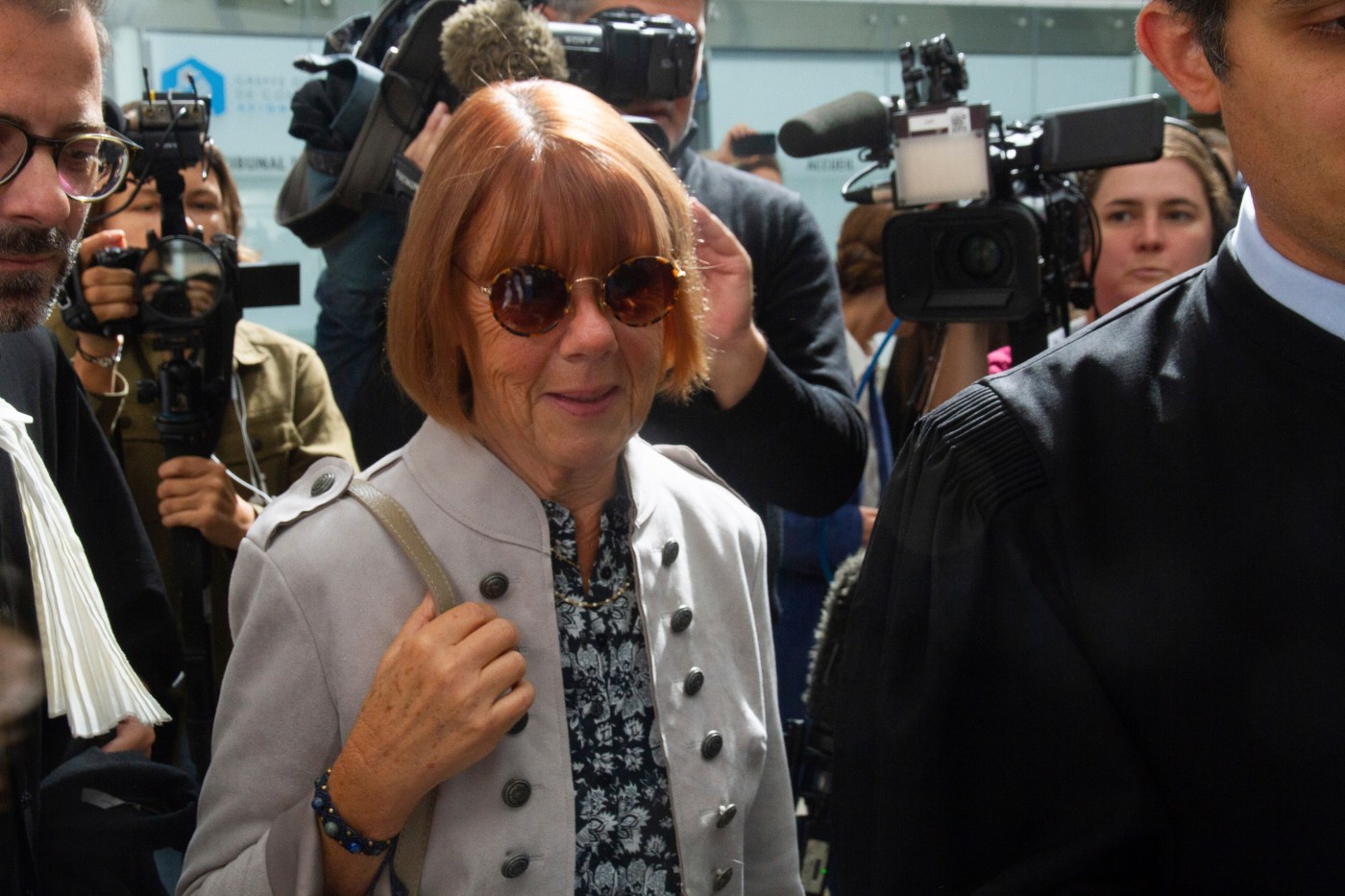
‘She didn’t deserve this’: Husband accused of raping wife testifies in French court
AVIGNON, France — Testifying for the first time in a trial that has transfixed and horrified France, Dominique Pelicot said Tuesday that he had “nothing but love” for his wife but a sex addiction controlled him, and he couldn’t stop himself from drugging her and raping her, and bringing other men into their home to rape her along with him while she was unconscious.
Pelicot, 71, added that his “perversion” was created by traumatic episodes in his childhood, notably a sexual assault he said he suffered at age 9, when he was admitted to hospital with a head injury and a nurse sexually assaulted him. His wife, he said, had saved him from that horror for a long time.
“She didn’t deserve this; I recognize that,” he said in tears sitting on the stand, his voice so weak the court strained to hear him.
“I regret what I did and ask for forgiveness, even if it’s unforgivable,” he said later, addressing his ex-wife, Gisèle Pelicot, who stood in the middle of the court and looked directly at him as he testified.
Including Dominique Pelicot, 51 men are on trial together, mostly on charges of the aggravated rape of Gisèle Pelicot. One has pleaded guilty for similarly drugging his own wife to rape her and inviting Dominique Pelicot to their home to rape her while she was drugged.
Pelicot’s appearance Tuesday came as a surprise. Just one week into the trial, he fell so ill that he missed four days of court, until the head judge finally postponed the hearing. Pelicot was diagnosed with kidney stones, a kidney infection and prostate problems.
After dispatching medical experts to assess him Monday, the Avignon court’s head judge, Roger Arata, ruled Pelicot was well enough to attend, seated in a comfortable chair and given regular breaks to rest.
The accused men fill the benches of the court. Eighteen of them sit in two glass boxes, one built especially for the trial. The rest arrive daily, many hiding their faces behind medical masks, hoods and baseball hats pulled over their heads, walking past a growing line of journalists and spectators.
They are a cross-section of working- and middle-class rural France, ranging in age from 26 to 74; they include truck drivers, members of the military, a nurse, an information technology specialist and a journalist. Most are accused of going to the retired couple’s house in the town of Mazan and raping Gisèle Pelicot once. A handful are accused of returning and raping her repeatedly.
More than a dozen have admitted their guilt, including Dominique Pelicot. But lawyers for many others have argued that their clients did not intend to rape Gisèle Pelicot. The lawyers for several have said they were tricked into believing they were joining a sexual threesome among consenting adults and that she was only pretending to sleep.
Over the past two weeks, many of the more than 40 lawyers in the courtroom have painted Dominique Pelicot as a master manipulator — overseeing the bedroom scene like a film director, coaxing the men, lying to them and urging them on.
“Without the intention to commit it, there is no rape,” Guillaume De Palma, a lawyer representing six of the accused, said in an interview. His clients, he said, had all gone to the Pelicots’ house just once, believing Gisèle Pelicot was consenting. None of them knew she had been drugged, he said.
“They were being filmed. So there was no reason to think it was a rape,” he said, adding that the idea of agreeing to being filmed while committing a rape was “surreal.”
In a voice that grew stronger as the morning proceeded, Dominique Pelicot addressed his fellow accused, speaking into a hand-held microphone.
“Today I maintain that I am a rapist, like those in this room,” said Pelicot, dressed in a zipped-up gray jacket that he removed over the course of the day as the room heated up. “They all knew her condition before they came; they knew everything. They cannot say otherwise.”
Later, his words caused a gasp among lawyers and defendants in the courtroom: “They came looking for me. I was asked; I said yes. They accepted; they came. I did not handcuff anybody to make them come to my place.”
Until the shock of Pelicot’s arrest in late 2020, his family members considered themselves very close, often visiting and vacationing together. By their descriptions, no one suspected anything. Pelicot agreed that it was “an ideal family” and added, “It was just me that wasn’t.”
He flatly refuted, time and time again, allegations made earlier in court that he had ever improperly touched — or attempted to touch — his daughter, Caroline Darian, or his grandchildren.
“When you suffered as a child what I suffered, you are not at all tempted by that kind of thing,” he said. “I have never touched a child. I would never touch one.”
As a teenager, he also was forced to witness a gang rape while working as an apprentice electrician on a construction site, he said. “I’m not looking for excuses, but these are the facts,” he said.
Asked about traces of photos of his daughter sleeping discovered by police in his electronics, Pelicot said he had not taken them and didn’t think they were of her. Darian, who is convinced that her father also drugged her, grew red-faced on the other side of the courtroom and shouted: “You are lying.”
“I don’t know how to tell you; I never touched my daughter,” Pelicot said.
Prosecutors pieced the case together after Pelicot was first arrested in September 2020 for filming up the skirts of women shopping in a grocery store. Police seized his electronic devices and a laptop from his home, discovering a first batch of videos and photos, which led to his arrest that November for the broader crimes.
Eventually police discovered more than 20,000 videos and photos on Pelicot’s computers and hard drives, many of them dated and labeled, in a folder titled “abuse.” Some of the videos are expected to be shown during the trial as evidence.
Explaining why he had taken the videos, edited them in a giant digital library and titled them all, Pelicot said: “Part pleasure but also, part insurance. Because of that, we could find all those who participated.”
Gisèle Pelicot, who has divorced her husband and renounced her former surname but is using it in court during the trial, was entitled under French law to remain anonymous and have the case tried privately. Instead, she made the relatively rare decision to ask that it be public.
She wanted to shift the shame to the accused, her lawyers said, and she stated that she hoped her story would help other victims of drugging and abuse.
During her own harrowing testimony, Pelicot described her former husband as the love of her life. They met at 19 and soon built a life together, having three children and then seven grandchildren, who often visited. She said she had no idea that she had been drugged or abused.
On Tuesday, she sat in court and listened, sometimes putting on her sunglasses to hide her emotion. When asked if she wanted to respond to her ex-husband’s testimony, she again took the stand and told the court that she found it all difficult to hear. They had been together for 50 years, she said, and “could never have imagined for a single second he could commit these acts of rape.”
“I had total trust in this man,” she said.
She had, however, suffered disturbing symptoms for many years that led her to fear she had a brain tumor or was developing Alzheimer’s: hair and weight loss, and large gaps in her memory, with whole days and nights blacked out.
As a result of her decision to testify publicly, she has become a feminist icon and hero of sexual assault survivors in France. Thousands of women rallied in support of her over the weekend at events across France. Posters and street paintings celebrating her have gone up not only in Avignon, but also elsewhere in the country.
The crowd of spectators — mostly women — arriving at the courthouse to watch the proceedings in a separate overflow room has grown bigger and bigger each day since the trial commenced Sept. 2.
“I’m here to support Gisèle Pelicot and the collateral victims,” said Eva Chova, 24, a law student, standing in the middle of the line after two hours of waiting. “I think we are seeing a historic process. There will surely be a before and an after this trial, and I hope this changes things.”
At lunch, many spectators formed a line between the courtroom and the building’s exit to boo the accused and applaud and cheer Pelicot as she walked by.
Earlier this week, Pelicot stopped briefly to acknowledge the support.
“Thanks to all of you, I have the strength to fight this battle to the end,” she told a battery of cameras and outstretched microphones. She offered a message to victims of sexual violence around the world.
“Look around you,” she said. “You are not alone.”
Related Articles
Hezbollah hit by a wave of exploding pagers in Lebanon and Syria. At least 9 dead, hundreds injured
Noah Feldman: Telegram CEO’s arrest smacks of empty posturing
Farah Stockman: There’s a right way and a wrong way to wield sanctions
Other voices: Ukraine needs more weapons and the permission to use them
Andrew Heffernan: The Paralympics are a unique manifestation of global cooperation


